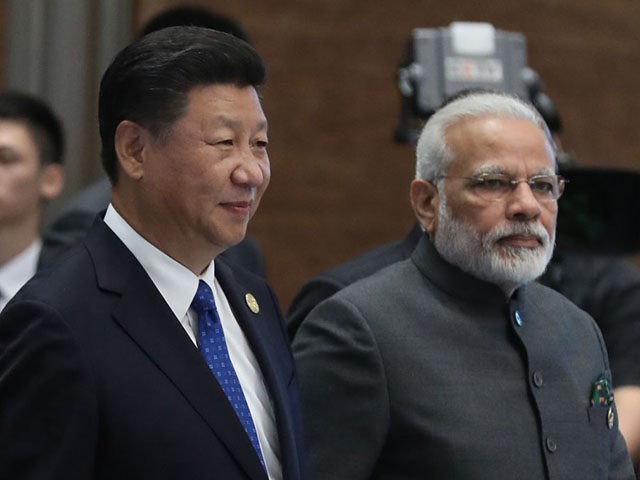Police in India arrested nine Tibetans, India media revealed on Monday, suspected of planning protests against Chinese Communist Party chairman Xi Jinping. Police have not offered any evidence that those arrested were planning any criminal behavior.
Xi is expected to land in Chennai, India, on Friday for talks with Prime Minister Narendra Modi. Modi has intensified tensions with China during his tenure, particularly by placing troops in the disputed Doklam plateau border territory in 2017 and with his annexation of parts of Kashmir, which China claims in part, in August.
The most prominent among the named activists arrested is Tenzin Tsundue, a Tibetan poet and writer who regularly participates in activities bringing awareness to China’s oppression of Tibetans and other ethnic minorities in the country. Tsundue was arrested on Saturday night, the Hindustan Times reported, in Tamil Nadu, near the facilities where Xi is expected to participate in summit events with Modi.
Tsundue was reportedly arrested for trying to book a hotel room, according to police sources speaking to the Hindustan Times.
“Tenzin had been arrested twice previously by Mumbai and Bengaluru police during visits by then Chinese premiers in 2002 and 2005 respectively,” an unnamed “top police official” said. “Tsundue had unfurled a banner reading ‘Free Tibet’ at Hotel Oberoi, Mumbai in 2002 where Chinese premier Zhu Rongji was addressing a gathering. He was arrested in Bangalore in 2005 for protesting against the then Chinese premier Wen Jiabao.”
The Hindu suggested in its report that Tsundue and eight others not yet named were arrested “under the provisions of the Criminal Law (Amendment) Act,” which was passed in 2013 to protect women from stalkers and gang attackers. The law specifically punishes acid attacks — used often to humiliate women considered beautiful — sexual harassment, voyeurism, and stalking. It is not clear how contemplating participation in a pro-human rights protest would fit the definition of any of these crimes.
The police sweep was reportedly a response to intelligence officials infiltrating Tibetan communities and hearing rumblings of an organized, peaceful protest against Xi. Tsundue had criticized Xi’s visit on Facebook.
The Hindu reported that police were told to “gather details of Tibetans living in their respective cities/districts” regardless of prior political activity. It did not specify any intelligence that would suggest the Tibetans were being identified as violent threats or even political actors, only as members of their ethnic group.
Tsundue is an activist with a long history of opposition to China’s colonization of Tibet. While he has spent most of his career writing about his experience as a Tibetan refugee and advocating for freedom from communism for his people, he is also a member of the Free Indo-Pacific Alliance, a coalition of anti-communist figures that includes Taiwanese, Indian, Mongolian, and Uighur leaders.
“We must defeat the Chinese Communist Party that is our common enemy by teaming up with countries and peoples that are under Chinese occupation today, and also countries around China that are increasingly facing threats from the Chinese hegemony, and all the other nations and peoples who are feeling threatened by China,” Rebiya Kadeer, a prominent Uighur activist and president of the Free Indo-Pacific Alliance, writes on its website. “If we remain divided, China will succeed in buying time. Therefore, we must stand together no matter what.”
Tsundue personally has written extensively about his experiences in exile in India and the Free Tibet movement, which has used peaceful protests to demand separation from communist Beijing.
China has repressed Tibet and imposed its communist ideology on Tibetan Buddhism for decades, forcing the Dalai Lama, the religion’s highest authority, into exile in 1959. Under dictator Xi, however, that repression has intensified, now coupled with Xi’s fervent attempts to establish a personality cult for himself. Chinese officials began pressuring individuals in Tibet to hang up photos of Xi in their homes in exchange for petty cash, insisting on “prominent” placement for the image; Xi has similarly pressured Christians elsewhere in the country to replace crosses in the home with photos of his face.
Last week, on the occasion of the 70th anniversary of China becoming a communist authoritarian regime, Chinese officials rounded up suspect Tibetans and forced locals to “celebrate” by performing communist songs in worship of the Party and Xi Jinping, according to eyewitnesses speaking to Radio Free Asia (RFA).
“All Tibetan retirees were ordered to practice singing patriotic songs [called red song] praising the motherland,” a local told the outlet. “The Chinese government even warned Tibetan parents, that their kids will be removed from schools, and government would stop giving subsidies to those Tibetan find worshipping and visiting the Jokhang Temple during the 70th anniversary,” an important site in Tibetan Buddhism.
RFA noted that anonymous Tibetans insisted the “celebrations” were forced and “do not reflect the feelings of most residents.”
China has dismissed the Dalai Lama as a dangerous terrorist and “Islamic State sympathizer,” without providing any evidence for acts of violence he has committed or ordered. In an attempt to fully co-opt the religion, Chinese communist authorities claim they have found the Panchen Lama, the second most important figure in Tibetan Buddhism and the Dalai Lama’s successor, despite the fact that only the Dalai Lama can choose the Panchen Lama. The child the Dalai Lama chose, Gedhun Choekyi Nyima, disappeared in 1995 after Chinese police forces abducted him.
Local Communist Party officials in Tibet have described the “struggle against the Dalai Lama” as their “highest priority.”
Xi is scheduled to arrive in Chennai, India, on Friday and will attend four separate meetings with Modi that day.

COMMENTS
Please let us know if you're having issues with commenting.